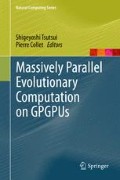Abstract
The objective in molecular docking is to determine the best binding mode of two molecules in silico. A common application of molecular docking is in drug discovery where a large number of ligands are docked into a protein to identify potential drug candidates. This is a computationally intensive problem especially if the flexibility of the molecules is taken into account. We show how MolDock, which is a high-accuracy method for flexible molecular docking using a variant of differential evolution, can be parallelised on both CPU and GPU. The methods presented for parallelising the workload result in an average speedup of 3.9× on a four-core CPU and 27.4× on a comparable CUDA-enabled GPU when docking 133 ligands of different sizes. Furthermore, the presented parallelisation schemes are generally applicable and can easily be adapted to other flexible docking methods.
Access this chapter
Tax calculation will be finalised at checkout
Purchases are for personal use only
Notes
- 1.
This work was done while the author “Martin Simonsen” was affiliated to the Bioinformatics Research Centre (BiRC), Aarhus University, Aarhus, Denmark.
References
Dagum, L., Menon, R.: OpenMP: an industry standard API for shared-memory programming. IEEE Comput. Sci. Eng. 5(1), 46–55 (2002)
Dorigo, M., Birattari, M., Stutzle, T.: Ant colony optimization. IEEE Comput. Intell. Mag. 1(4), 28–39 (2006)
Goodsell, D.S., Morris, G.M., Olson, A.J.: Automated docking of flexible ligands: applications of AutoDock. J. Mol. Recognit. 9(1), 1–5 (1996)
Goodsell, D.S., Olson, A.J.: Automated docking of substrates to proteins by simulated annealing. Proteins 8(3), 195–202 (1990)
Halperin, I., Ma, B., Wolfson, H., Nussinov, R.: Principles of docking: an overview of search algorithms and a guide to scoring functions. Proteins 47(4), 409–443 (2002)
Kannan, S., Ganji, R.: Porting AutoDock to CUDA. In: Computational Intelligence on Consumer Games and Graphics Hardware (2010)
Kirkpatrick, S.: Optimization by simulated annealing: quantitative studies. J. Stat. Phys. 220(4598), 671–80 (1984)
Korb, O.: PLANTS: application of ant colony optimization to structure-based drug design. Chem. Cent. J. 3(Suppl 1), O10 (2006)
Korb, O.: Efficient ant colony optimization algorithms for structure- and ligand-based drug design. Dissertation, Universität Konstanz (2008)
Kozakov, D., Brenke, R., Comeau, S., Vajda, S.: PIPER: an FFT-based protein docking program with pairwise potentials. Proteins 65(2), 392–406 (2006)
Matsumoto, M., Nishimura, T.: Mersenne Twister: a 623-dimensionally equidistributed uniform pseudo-random number generator. ACM Trans. Model. Comput. Simulat. 8(1), 3–30 (1998)
Muegge, I., Rarey, M.: Small molecule docking and scoring. In: Lipkowitz, K.B., Boyd, D.B. (eds.) Reviews in Computational Chemistry, chap. 1, pp. 1–60. Wiley, New York (2001)
Nissink, J.W.M., Murray, C., Hartshorn, M., Verdonk, M.L., Cole, J.C., Taylor, R.: A new test set for validating predictions of protein-ligand interaction. Proteins 49(4), 457–471 (2002)
Podlozhnyuk, V.: Parallel Mersenne Twister. Technical report, NVidia (2007)
Stone, J.E., Hardy, D.J., Ufimtsev, I.S., Schulten, K.: GPU-accelerated molecular modeling coming of age. J. Mol. Graph. Model. 29(2), 116–125 (2010)
Storn, R., Price, K.: Differential evolution—a simple and efficient heuristic for global optimization over continuous spaces. J. Global Optim. 11(4), 341–359 (1997)
Sukhwani, B., Herbordt, M.C.: GPU acceleration of a production molecular docking code. In: Proceedings of 2nd Workshop on General Purpose Processing on Graphics Processing Units (GPGPU-2), pp. 19–27. ACM, New York (2009)
Thomsen, R., Christensen, M.H.: MolDock: a new technique for high-accuracy molecular docking. J. Med. Chem. 49(11), 3315–3321 (2006)
Yang, J.M., Chen, C.C.: GEMDOCK: a generic evolutionary method for molecular docking. Proteins 55(2), 288–304 (2004)
Author information
Authors and Affiliations
Corresponding author
Editor information
Editors and Affiliations
Rights and permissions
Copyright information
© 2013 Springer-Verlag Berlin Heidelberg
About this chapter
Cite this chapter
Simonsen, M., Christensen, M.H., Thomsen, R., Pedersen, C.N.S. (2013). GPU-Accelerated High-Accuracy Molecular Docking Using Guided Differential Evolution. In: Tsutsui, S., Collet, P. (eds) Massively Parallel Evolutionary Computation on GPGPUs. Natural Computing Series. Springer, Berlin, Heidelberg. https://doi.org/10.1007/978-3-642-37959-8_16
Download citation
DOI: https://doi.org/10.1007/978-3-642-37959-8_16
Published:
Publisher Name: Springer, Berlin, Heidelberg
Print ISBN: 978-3-642-37958-1
Online ISBN: 978-3-642-37959-8
eBook Packages: Computer ScienceComputer Science (R0)

